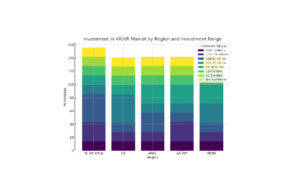Augmented and Virtual Reality (AR/VR) made profound impacts globally last year, captivating not only smartphone users but also enticing emerging and established brands. This surge has spurred entrepreneurs and marketers to explore investments in AR/VR app development, marking just the initial phase of a burgeoning trend.
Over recent years, AR/VR has catalyzed transformative shifts in various industries, with projections indicating a robust market growth trajectory. The impending AR/VR technology trends are poised to reshape interpersonal connections and propel us towards a ‘digitally augmented’ future.
Before delving into future trends, it’s crucial to assess the present state of AR/VR technology, which has evolved significantly since the introduction of Google VR Tilt Brush, permeating both hardware and software domains.
Current Landscape of the AR/VR Market
Initially, hardware-centric, virtual reality has expanded into the software realm, becoming a dominant force in gaming, entertainment, and diverse industrial applications. Augmented reality, too, has garnered widespread attention, particularly for its potential in enhancing business operations and fostering innovation.
According to IDC forecasts, AR/VR spending accounted for about 60% of the global total in 2018, with projections indicating a surge to 85% by the end of 2021. Markets and Markets anticipate the VR market to grow from USD 6.1 billion in 2020 to USD 20.9 billion by 2025, reflecting a robust CAGR of 27.9%.
Geographically, North America has emerged as a leading investor in AR/VR technologies, with substantial growth anticipated in the coming years.
Global Investment in AR/VR
Large enterprises are expected to dominate the AR/VR market share by 2025, leveraging these technologies to streamline operations efficiently. Concurrently, Small and Medium-sized Enterprises (SMEs) are projected to intensify their engagement, indicating a promising trajectory for market expansion.
With a grasp of the current AR/VR landscape, let’s explore the trends and technologies set to propel its growth.

- Integration of AI in AR/VR Space:Collaboration between AI, AR, and VR technologies will drive innovation, enhancing visualization and comprehension capabilities. This synergy will lead to highly interactive workspaces and improved image recognition.
2. The surge in AR Avatars: The popularity of virtual celebrities signifies a rise in AR avatars, which businesses will leverage to enhance user experience and navigation.
3. AR Integration in Vehicles: Automotive leaders will adopt AR to revolutionize self-driving cars, introducing features like in-car AR and voice assistants.
4. 5G-Powered Evolution: The advent of 5G will accelerate AR/VR evolution, enabling seamless data transfer and enhanced virtual experiences, even in low-bandwidth environments.
5. Rise of WebAR: Web-based AR will democratize access to augmented reality experiences, transcending device limitations and enhancing accessibility.
6. Advancements in AR/VR Displays: Continued advancements in displays will ensure optimal viewing experiences, reducing eye strain and delivering high-quality content.
7. Remote Assistance via AR/VR: AR/VR technologies will facilitate real-time remote assistance and collaboration, enhancing problem-solving capabilities.
8. XR in Healthcare: Integration of AR, MR, and VR will revolutionize healthcare practices, fostering productivity, efficiency, and real-time learning experiences.
9. AR-Based Indoor Navigation: AR-powered navigation systems will transform indoor navigation, offering intuitive guidance and enhancing user experiences.
10. Educational Adoption of AR/VR: Education will witness significant AR/VR adoption, revolutionizing learning experiences and bridging gaps in distance education.
The Future of Augmented Reality and Virtual Reality
Customized AR/VR gadgets will redefine user experiences, with AR glasses poised to emerge as viable smartphone alternatives. Businesses must stay abreast of emerging trends and collaborate with top AR/VR companies to leverage these technologies effectively, positioning themselves for sustained growth in the digital era.
In conclusion, the AR/VR revolution is underway, and businesses must adapt to thrive in this rapidly evolving landscape.




